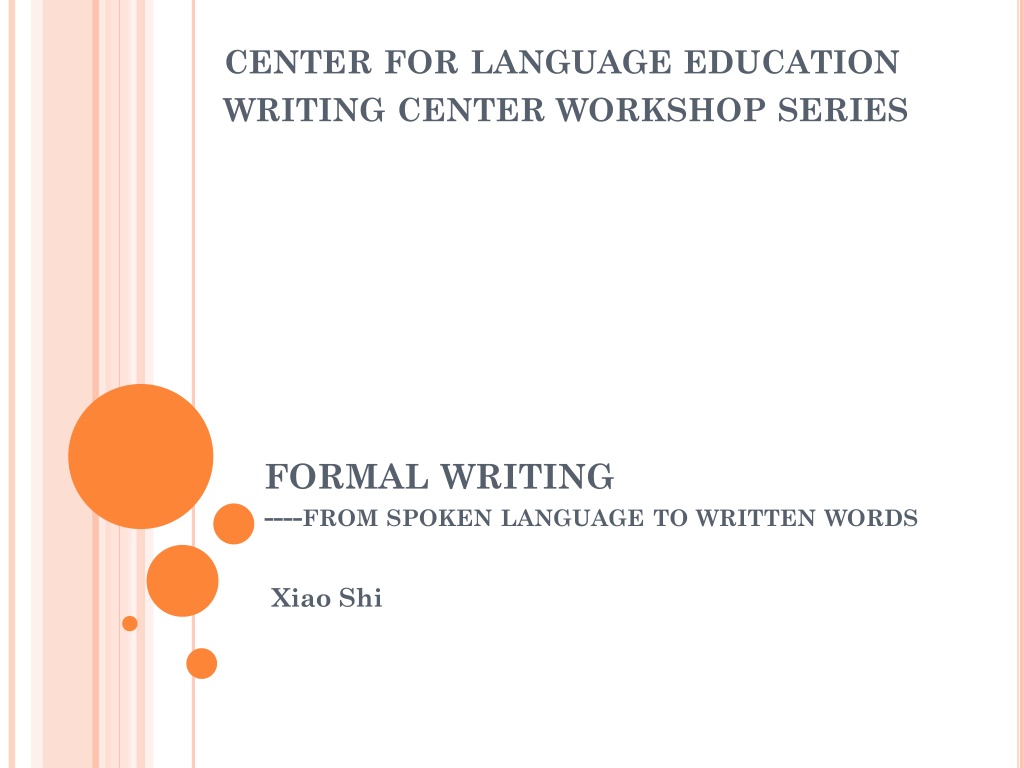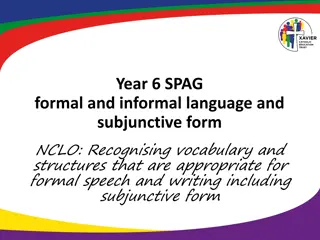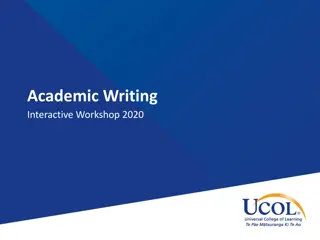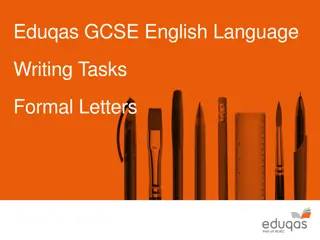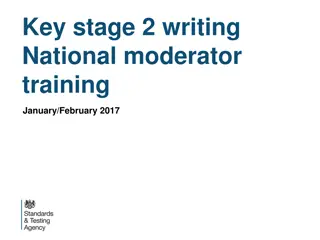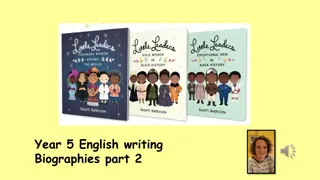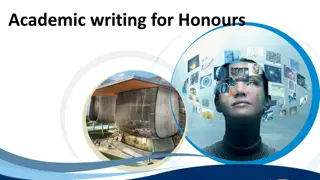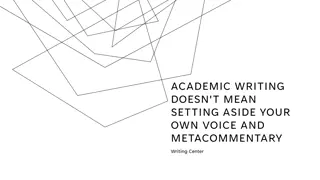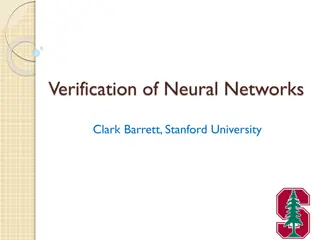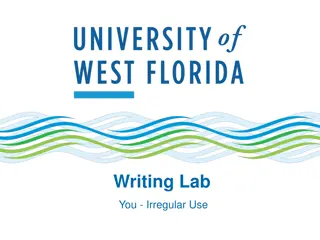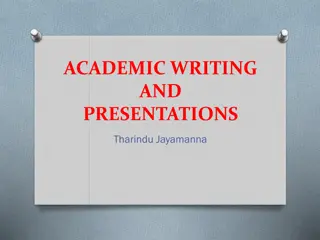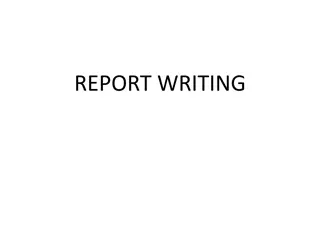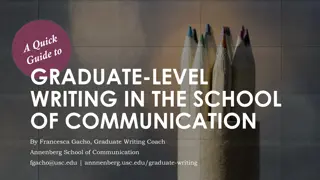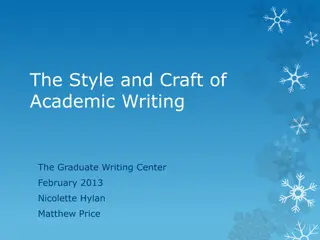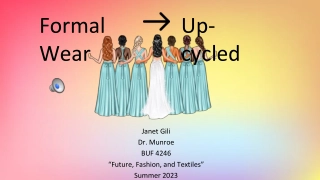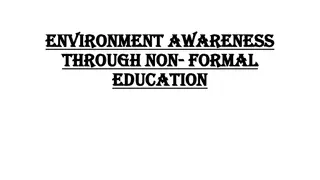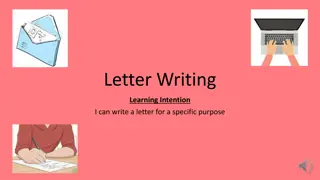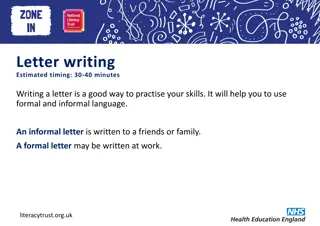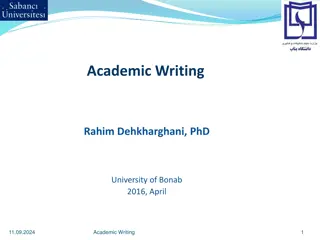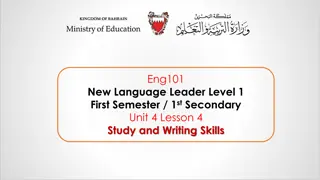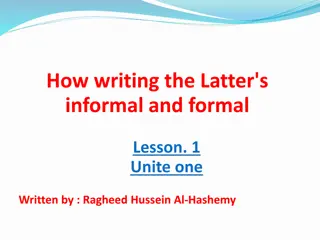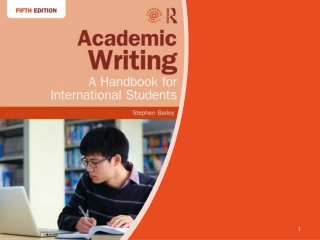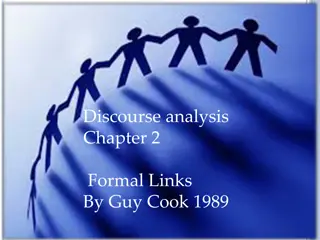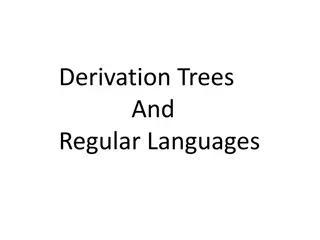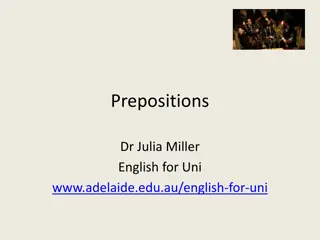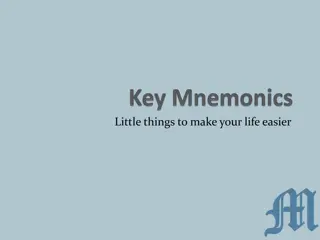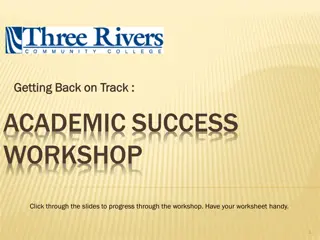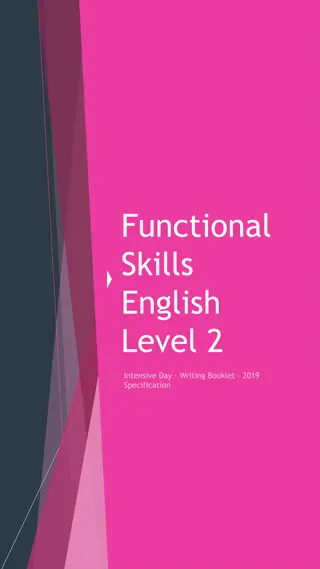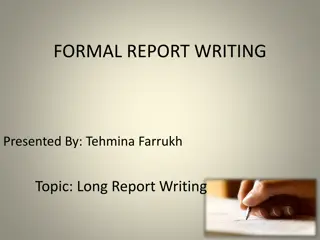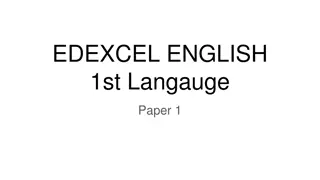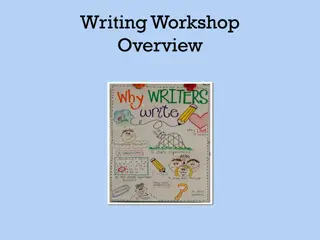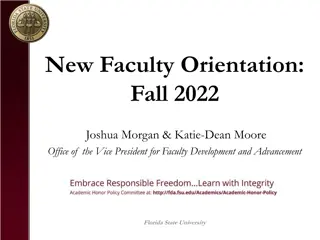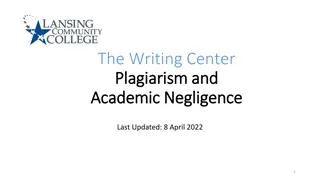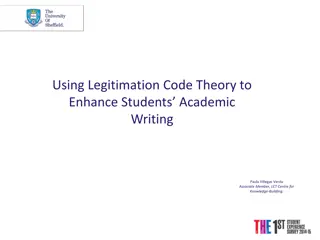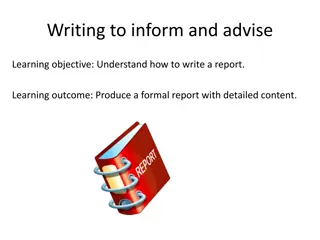Academic Writing Workshop Series: Formal Language Techniques
Explore how to transition from spoken language to formal writing in this workshop series. Participants will engage in activities such as sharing their favorite movies or books, free writing exercises, and learning about academic language features like formality, objectivity, and conciseness. The workshop emphasizes the importance of clear expression and effective communication in academic writing settings.
Download Presentation

Please find below an Image/Link to download the presentation.
The content on the website is provided AS IS for your information and personal use only. It may not be sold, licensed, or shared on other websites without obtaining consent from the author. Download presentation by click this link. If you encounter any issues during the download, it is possible that the publisher has removed the file from their server.
E N D
Presentation Transcript
CENTER FOR LANGUAGE EDUCATION WRITING CENTER WORKSHOP SERIES FORMAL WRITING ----FROM SPOKEN LANGUAGE TO WRITTEN WORDS Xiao Shi
SHARING Share with a partner a movie or a book that you like Describe what happen in the movie or book and the reason that you like it so much.
FREE WRITING Write a paragraph about the book or movie Write down as much as you can (6-10 sentences) Keep writing and don t worry about language
ACADEMIC LANGUAGE FEATURES Formal Objective Cautious Concise You know, the extraordinary thing about going in for interviews is that you don t realize, because you don t get told, all this long period of waiting, when you re kept hanging about while various officials stride up and down, wearing fancy uniforms and looking full of serious purpose, is actually something they make you go through deliberately so the people who are going to interview you get a chance to observe how you perform when you re up against this kind of stress. Before the interview there is an inordinately long delay, during which uninformed officials stride purposefully up and down. Unknown to the candidate, the delay is deliberately contrived so that the panel can observe this behavior under conditions of stress.
ACADEMIC LANGUAGE FEATURE FORMAL The reason for using formal expressions is not because academic language is pompous, but because it is clearer (Gillett, Hammond & Martala, 2009, p89) Roberts says that lower house prices do not affect you if you are not planning to sell your property. say: assert, claim, suggest, discuss, conclude, state The decision he has made is bad. bad: unacceptable, dissatisfactory, imperfect, counterproductive, inefficient, arbitrary . Source: https://www.thesaurus.com/ Academic Word List
ACADEMIC LANGUAGE FEATURE OBJECTIVE Avoid using personal pronoun I think SUSTech students are hard working. In my opinion/As far as I am concerned, SUSTech students are hard working.
ACADEMIC LANGUAGE FEATURE OBJECTIVE Avoid using personal pronoun I think SUSTech students are hard working. In my opinion/As far as I am concerned, SUSTech students are hard working. You can see the correlation in table 1 The correlation can be seen in table 1. Avoid Emotive language The food at school canteen is terrible. The food at school canteen has little variety and no taste. The food provided by university canteen is wonderful. The food provided by university canteen is satisfactory for its balanced nutrition, rich flavor and big portion. Use specific evidence several ten, most of the population 70% , some time ago 3 years ago / in 2006
ACADEMIC LANGUAGE FEATURE CAUTIOUS Use hedges vocabulary that expresses degrees of certainty or accuracy (Frodesen & Wald, 2016, p175) All Chinese students are quite in class. (all, never, definitely, absolutely, undoubtedly, always...) Chinese students are quite in class Adverbs (generally, probably, likely, potentially ) Modal verbs (can, could, may, might ) Modifiers (most, some ) Verbs of uncertainty (appear to, seem to, tend to, ) Qualifying phrases (It is generally believed that )
ACADEMIC LANGUAGE FEATURE CONCISE Conciseness means using as few words as possible to make your point effectively (Osmond, 2016, p135) Avoid using phrasal verbs find out think about look into build up go down get worse deteriorate discover consider investigate accumulate decrease
ACADEMIC LANGUAGE FEATURE CONCISE Conciseness means using as few words as possible to make your point effectively (Osmond, 2016, p135) Change negatives to affirmatives not any not much not many not different not the same not allow not notice overlook no little few same different forbid
ACADEMIC LANGUAGE FEATURE CONCISE Avoid redundancy In order to improve my academic writing, I attend the workshop. To improve my academic writing, I attend the workshop. Due to the fact that pork price increase dramatically, larger amount of beef is consumed. Because pork price increase dramatically, larger amount of beef is consumed. There are many schools which have implemented a more flexible curriculum. Many schools have implemented a more flexible curriculum There is a risk of Siberian Tigers becoming extinct. Siberian Tigers are at the risk of extinction.
ACADEMIC LANGUAGE FEATURES Formal Use clear and specific vocabulary Objective Avoid using personal pronoun Avoid Emotive language Use specific evidence Cautious (Use hedges) Adverbs Modal Modifiers Verbs of uncertainty Qualifying phrases Concise Avoid using phrasal verbs Change negatives to affirmatives Avoid redundancy
FREE WRITING SAMPLE The old man and the sea is my favorite book. It is written by the famous American writer, Ernest Hemingway. It is about an old man who catch a very big fish and have to fight with sharks to protect the fish from being eaten by the shark. In the end, the man won the fight with the sharks though the big fish was eaten almost entirely by the sharks. I love this story because it teaches us to never give up. A man can be destroyed but never defeated. The old man is a hero to me. He is very tough. It is very moving to me how he fought with the sharks again and again though he is old and alone. He won the battle finally.
FREE WRITING REVISION SAMPLE The Old Man and The Sea, by renowned American novelist Ernest Hemingway, describes how an old man fought and eventfully defeated several sharks from eating a giant fish he had caught. This is an inspiring short novel that teaches perseverance and hope. A man can be destroyed but not defeated. (Ernest Hemingway, n.d.) The old man is a hero. His toughness and constant spirit to fight result in victory in the battle. Ernest Hemingway Quotes. (n.d.). BrainyQuote.com. Retrieved November 20, 2019, from BrainyQuote.com Web site:https://www.brainyquote.com/quotes/ ernest_hemingway_152926
FREE WRITING REVISION Use the academic language features and tips to revise your free writing Formal Use clear and specific vocabulary Cautious (Use hedges) Adverbs Modal Modifiers Verbs of uncertainty Qualifying phrases Objective Avoid using personal pronoun Avoid Emotive language Use specific evidence Concise Avoid using phrasal verbs Change negatives to affirmatives Avoid redundancy
REFERENCE Frodesen, J., & Wald, M. (2016). Exploring options in academic writing : Effective vocabulary and grammar use. Ann Arbor: University of Michigan Press Gillet, A., Hammond, A., & Martala, M. (2009). Successful academic writing (Inside track). London ; New York: Pearson Education. Osmond, A. (2016). Academic writing and grammar for students (2nd ed.). Los Angeles: Sage Publications.
UPCOMING EVENTS EAP Writing Workshop SUSTech Reader Poetry Contest
